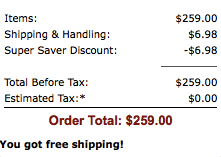Online retail continues to grow while local communities struggle with deep economic problems. Do these two economic trajectories have anything to do with one other? While there may not be a causal link between the two trends, it's time for online-only retailers to do the right thing: Charge and pay local sales tax.
Put very simply, the convoluted online tax system works like this: If a retailer maintains physical commercial space in a state, people who buy from its online domain are required to pay sales tax on their purchases. This is why individuals pay sales tax when shopping online from websites like Walmart or Costco.
If an online retailer does not maintain a physical presence, it does not charge and don't pay sales tax. This is why individuals don't pay sales tax when you purchasing on websites like Amazon or MacMall.
In the current system, local communities subsidize online-only retailers at the expense of bricks and mortar stores - you know, the retailers that provide jobs to the people in your community. Even more distressing, these subsidies come from local tax coffers.
It's time to change the system: All online retailers must be made to pay and charge a sales tax to help local communities.
The choice is ours, really, as consumers. What do we support more? Roads, schools and police in our cities and towns? Or 4-6% off our consumer purchases?
We may think that we're saving by embracing the rapidly growing realm of e-commerce, but in reality, we end up paying in an unacknowledged capacity - either through property taxes or increased sales tax, which hits our local retailers even harder.
- According to Mercent, Black Friday online sales for 2009 grew by 41% since 2008. That does not even include so-called Black Monday.
- Washington Post's David Ignatius perceives the Californiazation of America, where local government don't have the will to balance spending with tax revenue, as inviting another looming financial meltdown.
- Seth Godin shows succinctly how online retailers have already changed the nature of the record and bookstores. Online commerce has won here and is winning in other areas as well.
 Online retailers don't need our help and don't need to be subsidized. They already offer more choice, greater convenience and more competitive pricing than brick and mortar stores. Our communities need our help. The question is whether lawmakers have the guts to legislate this much-needed change. I doubt they do. Maybe concerned local citizens should band together and publicly target and shame the sites that don't support their communities through local sales tax.
Online retailers don't need our help and don't need to be subsidized. They already offer more choice, greater convenience and more competitive pricing than brick and mortar stores. Our communities need our help. The question is whether lawmakers have the guts to legislate this much-needed change. I doubt they do. Maybe concerned local citizens should band together and publicly target and shame the sites that don't support their communities through local sales tax.
The difference between one online retailer and another is pretty slim. If the choice is between supporting my local police force and supporting some unknown corporate wonk, the choice is easy, if somewhat blunt.
And if you really don't want to pay sales tax, there's always New Hampshire, where you can basically live free or die.
Come on, online retailers. It's time to do the right thing. Pay up.
